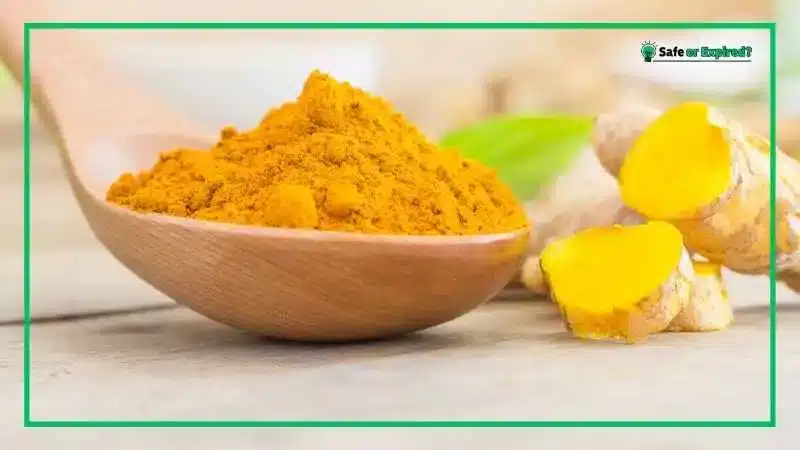“Does turmeric go bad?” is a popular topic for health-conscious families. Yes, turmeric can lose its flavor over time, and improper storage can cause it to spoil faster. Worry not; this blog will teach you how to keep your turmeric fresh and what to do with it when it’s expired.
Stick to the end to discover all the tips you need to make the most out of your turmeric!
Does Turmeric Go Bad? Learn the Critical Details
Yes, turmeric can go bad. Fresh turmeric typically lasts for about 1 to 2 weeks when stored properly, while ground turmeric has a longer shelf life of up to 3 years if kept in a cool, dark pantry. Signs of spoilage include a loss of flavor, color fading, etc.
Proper storage methods can help extend the freshness and potency of turmeric, ensuring you get the most out of this vibrant spice. Let’s answer some queries related to storage practices now.
Does Turmeric Go Bad if Not Refrigerated?
Fresh turmeric can go bad if not refrigerated. When left at room temperature, it may last only a few days before it starts to spoil. Fresh turmeric should ideally be stored in the refrigerator. I always recommend people wrap the turmeric in a paper towel, so that it retains its freshness.
On the other hand, ground turmeric can be stored in a cool, dark pantry. However, exposure to heat, light, and air can cause it to lose its flavor.
Does Turmeric Go Bad in the Fridge?
Yes, fresh turmeric can still go bad in the fridge if not stored properly. It is essential to wrap it in a paper towel and place it in a box or container. Doing this will prevent moisture buildup, which can lead to mold growth.
Fresh turmeric stored this way can last up to 2 weeks. Ground turmeric does not need refrigeration and should be kept in a tightly sealed container in a dry place to maintain its flavor and potency.
| Storage Condition | Opened | Un-Opened |
| Counter | 3-5 days | 1-2 years |
| Fridge | 1-2 weeks | Two weeks |
| Freezer | 6-8 months | 6-8 months |
Just like turmeric, it’s good to keep tabs on all your spices, including cinnamon. Check out the guide to see if your cinnamon has expired and how to best store it.
Is It Okay To Use Expired Turmeric Powder? Let’s Find Out
Yes, you can use expired turmeric powder. While it may lose some of its flavor, it is generally safe to consume. Ensure there are no signs of spoilage, such as a musty smell or mold.
The potential side effects of using expired turmeric powder are:
Reduced Potency and Flavor
When turmeric powder expires, its potency and flavor start to decline. This means your dishes might not taste as vibrant or flavorful as they should. Turmeric is known for its strong, earthy taste and bright yellow color, which can fade over time.
So, using expired turmeric might not give you the full culinary experience you’re expecting.
Stomach Upset
Using old turmeric powder can sometimes cause mild stomach upset. This is because the essential oils and compounds in turmeric degrade over time, which can affect how your body processes it.
If you notice any discomfort after using expired turmeric, it might be best to avoid using it in the future and get a fresh batch instead.
Allergic Reactions
Some people have also experienced allergic reactions to expired turmeric powder. Symptoms can include itching, swelling, or a rash. If you have sensitive skin or a known allergy to turmeric, it’s important to be cautious.
Always test a small amount first to see how your body reacts, especially if the turmeric is past its prime.
Potential Contamination
Expired turmeric powder stored improperly can become contaminated with mold or bacteria. This can happen if it’s exposed to moisture or not sealed tightly. Consuming contaminated turmeric can lead to food poisoning symptoms like nausea, vomiting, and diarrhea.
Always check for any unusual smell, color, or texture before using expired turmeric.
If you’re curious about turmeric’s longevity, you might also want to check the status of another kitchen staple: garlic powder. Fead – How do you tell if garlic powder has gone bad?
How To Know if Turmeric Powder Has Gone Bad?
To know if turmeric powder has gone bad, check for changes in smell, color, and texture. If it smells musty, looks faded, or has clumps, it’s likely spoiled. Always store turmeric in a cool, dry pantry to keep it fresh.
Changes in Smell
One of the first signs that turmeric powder has gone bad is a change in its smell. Fresh turmeric has a strong, earthy aroma. If your turmeric powder smells musty, sour, or off in any way, it’s a sign that it has spoiled.
A musty smell indicates that the essential oils in the turmeric have degraded, and it might not be safe to use. Always give your turmeric a sniff test before using it in your cooking.
Faded Color
We all know that turmeric has a vibrant yellow color. Here’s what the powder should look like:

If you have fresh turmeric, then here’s an example of top-notch spice:

When turmeric goes bad, this color can fade. If you notice that your turmeric looks dull or pale compared to when you first bought it, it might have lost its potency.
The bright yellow color is a good indicator of freshness, so a faded color means it’s time to replace your turmeric. Keeping turmeric in an airtight container away from light can help maintain its color.
Clumpy Texture
Another sign that your turmeric powder has gone bad is if it becomes clumpy. Fresh turmeric powder should be smooth and free-flowing. Clumps can form if the turmeric has been exposed to moisture. This not only affects its quality but also indicates possible mold growth.
If your turmeric powder has clumps, it’s best to throw it out to avoid any health risks. Always store turmeric in a dry place to prevent clumping.
Bitter or Off Taste
Fresh turmeric has a distinct, slightly bitter taste that adds depth to dishes. When turmeric powder goes bad, its taste can become more bitter or just off. If you use a bit of the powder in your cooking and it doesn’t taste right, it’s probably past its prime.
An off-taste can ruin your recipes and might indicate that the turmeric is no longer good to use. Always taste a small amount if you’re unsure about its freshness.
These signs can help you determine if your turmeric powder is still good to use or if it’s time to buy a new batch. Keeping it in a cool, dark, and dry place will help maintain its freshness for longer.
What To Do with Expired Turmeric Powder? 4 Suggestions
You can repurpose expired turmeric powder for non-culinary uses, like making natural dyes, beauty treatments, or cleaning agents. Although it may not be ideal for cooking, it can still be useful around the house in various ways.
Natural Dye
Expired turmeric powder can be a fantastic natural dye. You can use it to color fabrics, Easter eggs, or even homemade playdough. To make a dye, mix the turmeric powder with water and bring it to a boil. Let it cool, and then use it to dye your items.
The vibrant yellow color can bring new life to old clothes or craft projects. This is a fun and eco-friendly way to use turmeric that’s past its prime.
Beauty Treatments
People often ask, “Can I use expired turmeric powder on my face?” Yes. It can be used in face masks..
To make a simple face mask, mix the turmeric powder with yogurt and honey. Apply it to your face and let it sit for about 10 minutes before rinsing off. This can help brighten your skin and reduce acne. Always do a patch test first to ensure you don’t have a reaction.
Cleaning Agent
Turmeric’s antibacterial properties make it useful as a cleaning agent. You can mix expired turmeric powder with baking soda and a little water to create a paste. This paste can be used to clean kitchen surfaces, sinks, and even pots and pans.
The mild abrasive quality helps scrub away grime, while the antibacterial properties help sanitize. Just be careful, as turmeric can stain surfaces, so it’s best used on areas where color won’t be an issue.
Garden Compost
If you don’t have a use for expired turmeric powder in your home, consider adding it to your garden compost. Turmeric can add valuable nutrients to your compost pile, which will eventually enrich your garden soil.
Sprinkle the turmeric powder evenly over your compost and mix it in well. This way, you’re recycling the turmeric and benefiting your garden at the same time. It’s a simple, environmentally friendly solution.
These tips can help you make the most of expired turmeric powder without wasting it. Whether you’re crafting, beautifying, cleaning, or gardening, there are plenty of creative ways to repurpose turmeric that’s no longer fresh enough to cook with.
Can You Take Expired Turmeric Capsules?
It’s not recommended to take expired turmeric capsules. While they may not be harmful, their potency and effectiveness could be reduced. Expired supplements might not provide the intended health benefits, and there’s a risk of degradation. It’s best to replace them with fresh capsules for optimal results and safety.
7 Proven Tips to Extend the Life of Your Turmeric
To extend the life of your turmeric, store it in airtight containers, keep it away from light and moisture, refrigerate fresh turmeric, and consider freezing it. Proper storage techniques can keep your turmeric fresh and flavorful for longer.
Use Airtight Containers
One of the best ways to keep your turmeric fresh is to store it in airtight containers. This prevents moisture and contaminants from getting in.
I recommend Glass jars with tight-fitting lids. You can also use plastic containers if they seal properly. Keeping air out helps maintain the flavor and potency of your turmeric for a longer time.
Keep Away from Light
Light can degrade the essential oils in turmeric, causing it to lose its flavor. Store your turmeric in a dark place, like a pantry or a cupboard. If you keep it in a glass jar, consider using amber or dark-colored glass to block out light.
This simple step can significantly extend the shelf life of your turmeric.
Avoid Moisture
Moisture is turmeric’s enemy. It can lead to mold and spoilage. To keep your turmeric dry, always use a clean, dry spoon when scooping it out. Never place wet utensils in the container.
Additionally, store your turmeric in a dry place to avoid any humidity that might cause moisture buildup. These precautions will help keep your turmeric in good condition.
Refrigerate Fresh Turmeric
If you have fresh turmeric roots, refrigeration is key. Wrap the roots in a paper towel to absorb excess moisture, then place them in a plastic bag or an airtight container. Stored this way, fresh turmeric can last up to two weeks.
Refrigeration slows down the spoilage process and keeps your turmeric fresh and ready to use.
Freeze for Long-Term Storage
For even longer storage, consider freezing your turmeric. Both fresh roots and ground turmeric can be frozen. For fresh turmeric, peel and chop it into small pieces before placing it in a freezer-safe bag. Ground turmeric can be frozen in its original container or transferred to a freezer-safe jar. Freezing preserves the flavor and potency for several months.
Use Desiccant Packs
Desiccant packs, like the ones you find in new shoes, can help keep your turmeric dry. Place a desiccant pack in the container with your turmeric to absorb any excess moisture. This is especially useful in humid climates.
Buy in Small Quantities
Finally, consider buying turmeric in smaller quantities. This way, you can use it up while it’s still fresh. Bulk buying might seem economical, but if you don’t use turmeric frequently, it can end up going bad before you finish it. Smaller amounts ensure you always have fresh, flavorful turmeric on hand.
Conclusion
Understanding the shelf life of turmeric is essential for ensuring its freshness and potency. Here are the key points to remember:
- Fresh turmeric lasts 1-2 weeks in the fridge and 6-8 months in the freezer.
- Ground turmeric can last 1-2 years if opened and up to 3 years if unopened when stored appropriately.
- Always check for spoilage signs, like changes in smell, color, and texture.
- Expired turmeric can still be useful in non-culinary ways, such as natural dyes and cleaning agents.
By knowing the shelf life and proper usage of turmeric, you can maximize its benefits and enjoy its vibrant flavor in your cooking and beyond.

